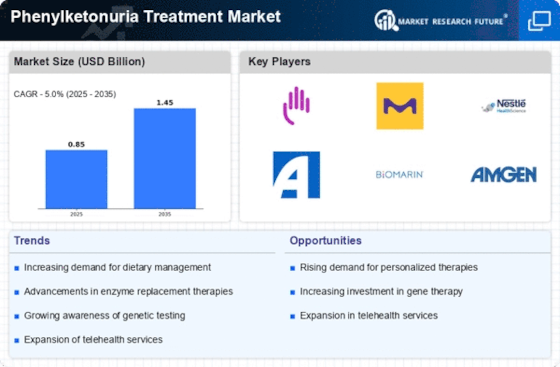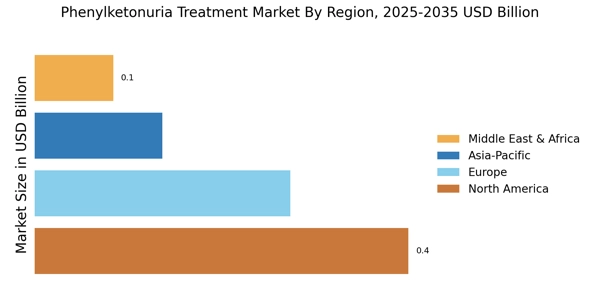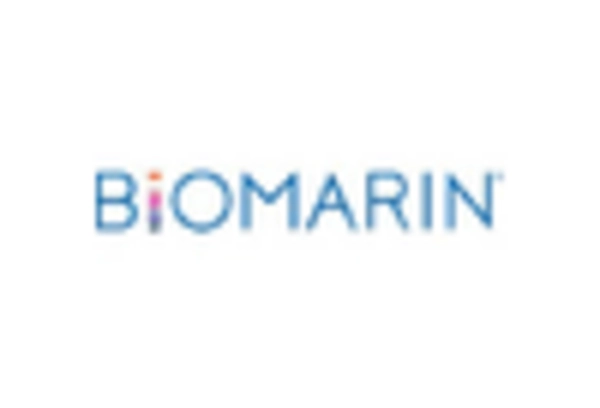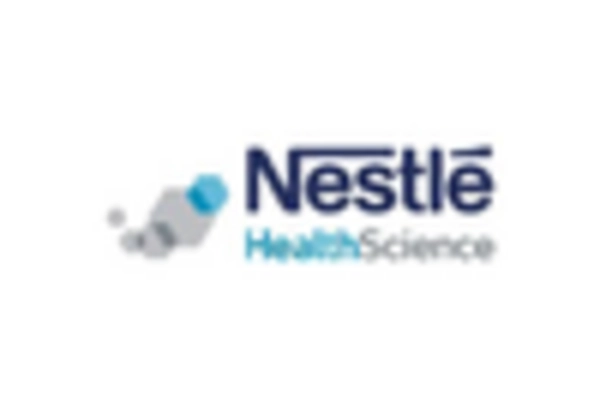Advancements in Treatment Options
Advancements in treatment options for phenylketonuria are significantly influencing the Phenylketonuria Treatment Market. The development of new therapies, including enzyme replacement therapies and gene therapies, has the potential to transform the management of PKU. For instance, recent innovations have led to the introduction of medications that can help patients metabolize phenylalanine more effectively. This evolution in treatment modalities is expected to enhance patient outcomes and adherence to dietary restrictions, thereby expanding the market. Furthermore, the integration of these advanced therapies into clinical practice may lead to increased investment in research and development, fostering a competitive landscape within the Phenylketonuria Treatment Market.
Rising Incidence of Phenylketonuria
The increasing incidence of phenylketonuria (PKU) is a primary driver for the Phenylketonuria Treatment Market. Recent data indicates that the prevalence of PKU is approximately 1 in 10,000 births in various regions, leading to a heightened demand for effective treatment options. As awareness of genetic disorders grows, more infants are being screened for PKU, resulting in early diagnosis and intervention. This trend is likely to propel the market forward, as healthcare providers and families seek comprehensive treatment solutions to manage this lifelong condition. The rising incidence not only emphasizes the need for innovative therapies but also highlights the importance of dietary management and support services, which are integral components of the Phenylketonuria Treatment Market.
Increased Government Initiatives and Funding
Increased government initiatives and funding for rare diseases, including phenylketonuria, are playing a pivotal role in shaping the Phenylketonuria Treatment Market. Governments are recognizing the need for enhanced support for research, treatment accessibility, and patient education. Funding programs aimed at developing new therapies and improving screening processes are likely to bolster the market. For instance, initiatives that promote awareness and early diagnosis can lead to better health outcomes for patients, thereby increasing the demand for treatment options. This supportive environment is expected to encourage pharmaceutical companies to invest in the development of innovative solutions, ultimately benefiting the Phenylketonuria Treatment Market.
Growing Demand for Dietary Management Products
The growing demand for dietary management products is a crucial driver for the Phenylketonuria Treatment Market. Patients with PKU require strict dietary control to manage their condition, which has led to an increased market for specialized low-protein foods and supplements. The market for these dietary products is projected to grow as more individuals are diagnosed and seek effective management strategies. Additionally, the rise in health consciousness among consumers has resulted in a broader acceptance of specialized dietary products, further fueling demand. This trend underscores the importance of dietary management in the overall treatment of PKU, positioning dietary products as a vital segment within the Phenylketonuria Treatment Market.
Rising Awareness Among Healthcare Professionals
Rising awareness among healthcare professionals regarding phenylketonuria is a significant driver for the Phenylketonuria Treatment Market. As medical education evolves, more healthcare providers are being trained to recognize and manage PKU effectively. This increased awareness is likely to lead to earlier diagnosis and intervention, which is crucial for improving patient outcomes. Furthermore, healthcare professionals are becoming more informed about the latest treatment options and dietary management strategies, which can enhance patient care. The growing emphasis on continuing medical education and professional development in this area is expected to contribute positively to the Phenylketonuria Treatment Market, as it fosters a more knowledgeable healthcare workforce.

















